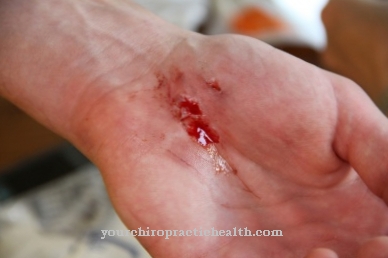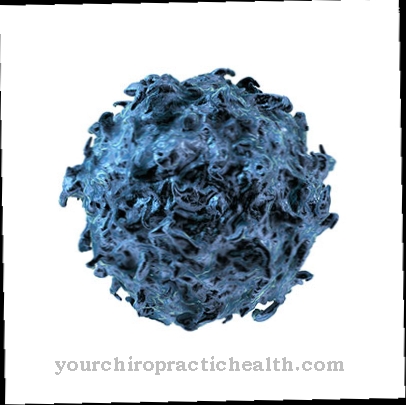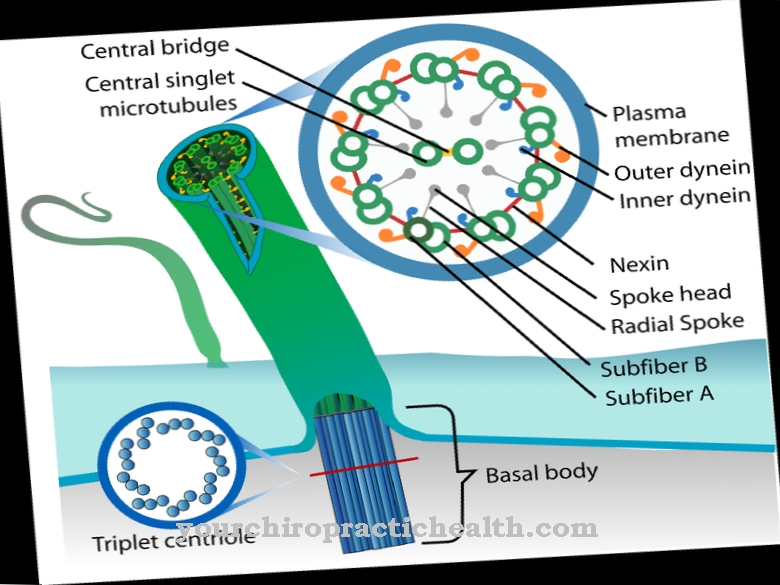Under a Anal prolapse an incident of the anus is understood. This results in the anal canal emerging from the anus.
What is anal prolapse?

Anal prolapse is a prolapse of the anal canal skin and mucous membrane in the external direction. It is caused by defecation or heavy pressing in front of it. The anal skin is not sufficiently attached to the sphincter muscle located below it. Following the bowel movement, the anal canal is withdrawn.
Leaking the canal can also result from lifting heavy weights, sneezing or coughing. If parts of the rectum or rectum also protrude from the anus, it is referred to as a prolapse or prolapse of the rectum. Anal prolapse can in principle occur at any age. However, older people are particularly affected. This primarily includes women.
causes
There are several possible causes for the occurrence of anal prolapse. The main reason is weak pelvic floor muscles in the affected person. The anal prolapse occurs only very rarely in children and usually occurs before the age of three. In most cases, the prolapse is triggered by underlying diseases such as cystic fibrosis. The reason for anal prolapse in adults is usually the general sagging of the pelvic floor.
This can also cause an incident from other organs. These include the urinary bladder or the uterus. It is not uncommon for women to have pelvic floor damage during childbirth. This also increases the risk of age-related incidents. There are also some risk factors that increase the likelihood of anal prolapse. These include chronic constipation and increased defecation pressure.
The muscles of the pelvic floor then no longer have enough strength to counteract an incident. Other risk factors include injuries to the sphincter muscle, congenital malformations, gynecological interventions, neurological damage to the pelvic nerves, as well as inflammation and tumors.
Symptoms, ailments & signs
Pain rarely occurs with anal prolapse. Instead, palpable parts of the intestine or folds of the mucous membrane emerge from the anus. Sometimes the shares can slide back by themselves. Pushing it back by hand is also possible. Some patients also experience severe itching in the anus area.
Since the sphincter muscle is also affected by an anal prolapse, it is not uncommon for faecal incontinence, so that the bowel movement can usually no longer be controlled. As a result, people pass stool without wanting to. However, the intensity of incontinence varies. It is lower in anal prolapse than in rectal prolapse. Another possible symptom is mechanical irritation of the mucous membrane that emerges from anal prolapse.
The friction forces can cause inflammation and bleeding. Sometimes ulcers also develop. A discharge of mucus and blood from the anus is also conceivable. As the symptoms develop further as the disease progresses, it is important to start medical treatment quickly.
Diagnosis & course
In most cases, the mere glance of an experienced doctor is enough to diagnose anal prolapse. This can also differentiate whether it is an anal prolapse or a rectal prolapse. Further examinations are also possible to confirm and better estimate the extent of the disease. This can be a sonography (ultrasound examination) or an endoscopy of the lower intestinal area.
If the exact degree of the prolapse cannot be assessed, a defecogram is carried out. To do this, the patient has to pass stool under X-ray control. Since this examination is very uncomfortable for those affected, it is only carried out in rare cases. Anal prolapse is not life-threatening. However, it can usually only be treated effectively through an operation. The procedure can usually successfully resolve the prolapse.
Complications
The anal prolapse causes the anal canal to emerge unintentionally from the anus. The symptom runs down to the final appearance in different stages and only manifests itself in the later years of life. Excessive pressure when defecating can damage the anal canal to such an extent that even minimal movements can lead to an incident.
A weak connective tissue is assumed to be the pathogenesis. This can be genetic, but it can also occur in families with hemorrhoids and fecal incontinence. In women, there may be weakness of the pelvic floor due to childbirth, which latently promotes the symptom. Women and the elderly are more likely to have anal prolapse than children.
If the symptom is not treated in a timely manner, there are significant complications. The anal canal can protrude far from the anus. The disease also spreads to the rectum and rectum. The patient experiences pain, incontinence and a severe loss of quality of life. As a medical measure, the bowel can usually be pushed back.
If this does not succeed, an emergency operation is initiated. The patient then receives drug therapy and physiotherapeutic pelvic floor exercises in order to avoid complications. Depending on the severity of the incident, eating habits must be changed consistently so that the stool remains soft. If the diagnosis is made in good time, the chances of recovery increase.
When should you go to the doctor?
If after a bowel movement parts of the intestine can be palpated at the anus, a doctor should be consulted. The doctor can usually determine at a glance whether it is an anal prolapse. Depending on the diagnosis, appropriate treatment can then be initiated which should help the prolapse to resolve rapidly. However, if the anal prolapse is left untreated, serious complications can arise. It can lead to pain, incontinence and diseases of the rectum and rectum, among other things.
If the anal prolapse is so advanced that serious health problems arise, an emergency doctor must be consulted. Usually the anal canal then has to be brought back into position by an emergency operation. To avoid this, it is advisable to see a doctor at the first signs of anal prolapse. Patients with hemorrhoids, cystic fibrosis, chronic constipation, inflammation or tumors must immediately discuss abnormalities in the anus with the responsible doctor. Medical advice is required at the latest in the case of fecal incontinence or a visible part of the intestine on the anus.
Doctors & therapists in your area
Treatment & Therapy
In most cases, anal prolapse is treated surgically. Surgical intervention can only be avoided occasionally. In children, treatment of the underlying disease is usually sufficient. If an operation has to be performed, a basic distinction is made between two methods. The procedure takes place either from the anus or through the abdominal cavity.
A procedure through the abdominal cavity is a laparoscopy (laparoscopy) or a laparotomy, in which an open abdominal incision is made. During this procedure, the rectum is fixed in such a way that sagging is no longer possible. For this purpose, the surgeon sutures the bowel at sacrum level. Sometimes a plastic net can also be used to secure the intestine. In some cases it is also necessary to tighten certain areas of the colon.
If the surgical intervention is carried out from the anus, the colon that has emerged is removed by the doctor. Then the two ends of the intestine are pushed back and sutured. In principle, an operation on the abdominal cavity is considered to be more efficient because the risk of subsequent complications is lower. However, the surgical risk for the patient is lower with an operation on the anus, but this also applies to the chances of success.
It is therefore important to weigh carefully between the two methods. After the operation, the patient is given special medication. He also has to follow a specific nutrition plan. This is used to keep the chair soft.
Outlook & forecast
As a rule, anal prolapse only rarely leads to severe pain or other symptoms. Those affected can usually push the parts of the anus or intestines back in themselves, and in many cases they slide back in by themselves.
Furthermore, anal prolapse also causes severe itching and reddening of the skin in many patients. If the person concerned scratches the area in question, the itching is increased. It is not uncommon for patients to suffer from fecal incontinence, which has a very negative effect on everyday life and quality of life.
It is not uncommon for psychological complaints or depression to occur. There may also be bleeding or inflammation, which can be painful. An ulcer can also develop. If the symptoms do not go away on their own, the person concerned should definitely consult a doctor. This disease does not usually reduce life expectancy.
The symptoms can be alleviated with the help of a surgical procedure. The further course mostly depends on the underlying disease. Usually there are no other complaints or complications.
prevention
The best preventive measure against anal prolapse is the early completion of gymnastic exercises to strengthen the pelvic floor, which should take place under the guidance of experts. In this way, the perineum and anus can be strengthened. It is also important to avoid constipation.
Aftercare
In many cases, anal prolapse is remedied by surgery, but it can also be treated conservatively. In both cases, consistent follow-up care is important for two reasons. On the one hand, it is important to regenerate the consequences of therapy such as a wound from an operation in the best possible way. On the other hand, targeted measures should prevent the recurrence of anal prolapse.
In both cases, follow-up care can be provided by the family doctor or the treating proctologist. The patient is also involved in the follow-up care by quickly reporting symptoms such as difficult bowel movements or pain or bleeding in the anal area to his doctor. A bowel movement that is not too hard is the most important aftercare and prevention at the same time.
Strong pressure during bowel movements must be avoided at all costs, as this is the reason for anal prolapse in many cases. That is why drinking enough water is just as important as a diet rich in fiber. The chair can be kept soft and voluminous with psyllium husks as a tried and tested home remedy. In addition to stool regulation, aftercare also includes caring for any surgical wounds.
This is done as directed by the doctor. Later, thorough hygiene is also important. Strong detergents and damp toilet paper are not recommended. Lukewarm water is sufficient in many cases. Dabbing dry with soft paper is important, as bacteria particularly prefer a moist environment.
You can do that yourself
Anal prolapse often severely restricts the quality of life of those affected. Many patients are embarrassed by their suffering and therefore delay a visit to the doctor. In any case, this should not be done. The earlier an anal prolapse is diagnosed and treated, the higher the chances of successful therapy. At the latest when an uncontrolled defecation has occurred for the first time, a doctor must be consulted.
An anal canal prolapse can usually only be treated surgically. However, since a weakness of the pelvic floor muscles is usually responsible for the fact that the anal canal and possibly parts of the intestine are not held inside the body, special exercises can help to prevent the problem or prevent the symptoms from returning after an operation. A healthy diet and regular exercise can prevent additional risk factors such as permanent constipation.
Women suffer from anal prolapse much more often than men, which is why a connection with pregnancy and (natural) childbirth is suspected. Women can therefore influence this risk through the number of births and the choice of delivery method.
If everyday situations, such as coughing or heavy lifting, lead to uncontrolled defecation, special diapers from specialist medical retailers can help those affected to feel safer again.

.jpg)

























